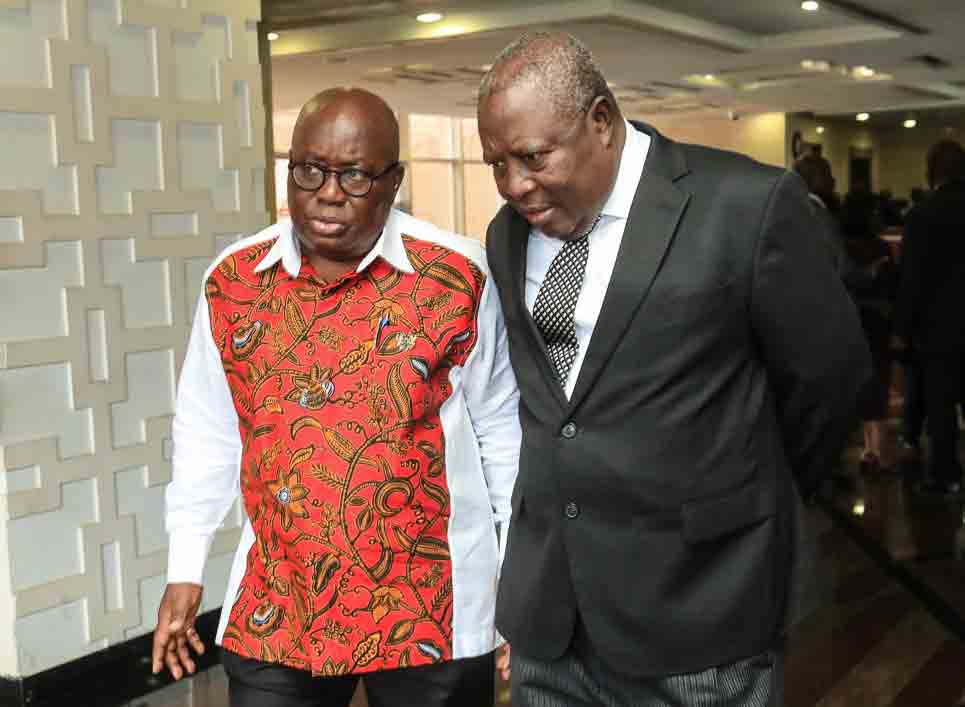Agyapa deal: mother of all suspected corruption since independence – Martin Amidu
Ghana’s immediate past Special Prosecutor has said that the government’s move to swap 49% of the country’s mineral royalties for development projects using a tax haven is the mother of all suspected corruption since independence.
This was contained in Martin Amidu’s latest response to President Akufo-Addo’s letter to him.
The government was seeking to raise a billion dollars from the London and Ghana Stock Exchange (GSE) in the deal.
Mr. Amidu subsequently investigated it and took issues with some aspects of the deal, which he said lacked value for money and also breached the country’s international transaction laws.
But weeks after he submitted the 64-page corruption assessment report and resigned, the former Special Prosecutor has returned to redefine the Agyapa deal in a 68-point response to the President.
“The Agyapa Royalties Limited Transaction contains the mother of all suspected corruption and corruption-related offences to be discovered in the first analysis of the risk of the prevention of corruption and anti-corruption assessment since Ghana attained its independence in 1957.

Despite the President’s dismissal of Mr Amidu’s claims that Mr Akufo-Addo attempted to persuade him to shelve the report, the former Special Prosecutor repeated his claim in his latest response.
He alleged in his 27-page response that the President asked him to put the report on ice “to allow him to deal with the matter through a statement to the public”.
According to Mr. Amidu, during one of his meetings with the President when he was being persuaded to shelve the report, “God (represented by the Holy Trinity in my Catholic faith) was in his own divine way revealing to me for the first time that the President of Ghana only looked like the innocent flower of the fight against corruption but was indeed the mother serpent of corruption under the innocent-looking flower of anti-corruption. And may God, encompassed in the Blessed Holy Trinity, be eternally praised for that divine revelation!”.
Amidu resigns
Martin Amidu resigned from his position on Monday, November 16, 2020.
The Former Special Prosecutor attributed his resignation to the traumatic experiences he went through after releasing the findings of his corruption assessment report on the Agyapa Royalties deal.
According to him, he had received death threats after submitting a copy of the report which among other things described databank, an investment company owned by the Minister of Finance as a decoy for the Imara investment company, the transaction advisor for the Agyapa deal.
The anti-corruption crusader, Mr. Amidu also accused the President of his failure to ensure his independence and freedom of action in the discharge of his (Amidu) duties.
“The one condition upon which I accepted to be nominated as the Special Prosecutor when you invited me to your Office on 10th January 2018 was your firm promise to me that you will respect and ensure same by your Government for my independence and freedom of action as the Special Prosecutor,” he stated in a press statement announcing his resignation.
He resigned weeks after he had submitted his corruption risk assessment report, which had not been received with applause by some elements of the governing, New Patriotic Party (NPP).
What Amidu’s report said
1.The Special Prosecutor’s work on the Agyapa deal was not an investigation. It is an audit to ensure the agreement complied with the law. The difference is that an investigation would suggest criminality.
- The appointment of the Transaction Advisor in the Agyapa deal should have been brought to parliament for approval because it is an international economic transaction. It is international because the government engaged a South African firm, IMARA Corporate Finance Limited (Pty), as a Transaction Advisor.
- In selecting the transaction advisor, the company had to get a local partner. IMARA selected Databank, but Special Prosecutor says this is a “decoy”.
- The report wants to know how Databank is being paid as a local partner. He said this arrangement is “opaque” which raises “reasonable suspicion of bid-rigging, and corruption activity, including the potential for illicit financial flows and money laundering.”
- There is a zero-chance that the advice given by the Transaction Advisor would be neutral and impartial because of individual interests at the Ministry of Finance and IMARA/Databank.
- Chief Director of the Ministry of Finance should have signed the agreement not the Deputy Minister of Finance, Charles Adu Boahen. This is because the Public Financial Management law gives the Chief Director that power to bind the Finance Ministry to an agreement.
- Several service providers and underwriters, including Africa Legal Associates, the legal firm owned by the president’s cousin Gabby Otchere Darko, may not have been chosen on merit. This is because they were not selected in accordance with the Public Procurement Authority.
- He believes the selection of the governing board members of the Minerals Income Investment Fund (MIIF) could not meet the litmus test of the prevention of corruption. The Chairman and the other Board members indicated “a real Likelihood of almost all of them being affected by partisan considerations” in the discharge of their duties.
- Parliament did not properly scrutinize the agreement, and this makes corruption attractive because “the risk is low”.
READ ALSO: I Worked 33 Months Without Pay – Special Prosecutor As He Resigns



